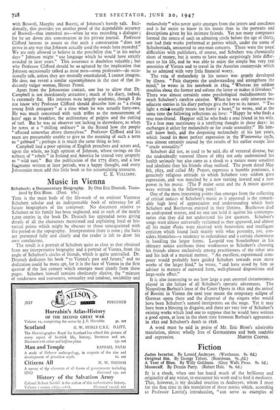Music in Vienna
Schubert: a Documentary Biography. By Otto Eric Deutsch. Trans- lated by Eric Blom. (Dent. 63s.)
Tins is the main body of the life-work of an eminent Viennese Schubert scholar and an indispensable book of reference for all future biographers of the composer. No document relative to Schubert or his family has been neglected, and to each of the nearly 1,200 entries in the book Dr. Deutsch has appended notes giving details of all the characters mentioned and explaining local or his- torical points which might be obscure to those unacquainted with the period or the topography. Interpretation there is none ; the facts are presented fully and clearly and the reader is left to draw his own conclusions.
The result is a portrait of Schubert quite as clear as that obtained from any interpretative biography and a portrait of Vienna, from the angle of Schubert's circles of friends, which is quite unrivalled. Dr. Deutsch dedicates his book " to Vienna's past and future," and no dedication could be more apt, for it is the face of Vienna in the first quarter of the last century which emerges most' clearly from these pages. Schubert himself remains obstinately elusive, the " mixture of tenderness and coarseness, sensuality and candour, sociability and
melancholy" who never quite emerges from the letters and anecdotes and is far easier to know in his music than in the portraits and descriptions given by his intimate friends. Yet not many composers formed the centre of such an admiring circle before the age of thirty, nor had their works performed at parties which, under the name of Schubertiads, amounted to one-man concerts. There were the usual difficulties with publishers, of course, and Schubert was chronically short of money, but it seems to have made surprisingly little differ- ence to his life, and he was able to enjoy the simple but very real amenities of Vienna and-to travel in the Austrian countryside which he so admired with very little financial worry.
The vein of melancholy in his nature was - greatly developed by illness. " Pain sharpens the understanding and strengthens the mind," he wrote in his notebook in 1824, " Whereas joy seldom troubles about the former and softens the latter or makes it frivolous." There was almost certainly some psychological maladjustment be- neath Schubert's carefree exterior. When he was only nineteen two adjacent entries in his diary perhaps give the key to its nature. " Too light a min‘ usually means too heavy a heart," he wrote, and at the same time the following reflections on love: "Happy he who finds a true man-friend. Happier still he who finds a true friend in his wife. To a free man matrimony is a terrifying thought in these days : he exchanges it either for melancholy or for crude sensuality." He him- self knew both, and the deepening melancholy of his last years, which found its *lost perfect expression in the Winterreise cycle, was almost certainly caused by the results of his earlier escape into " crude sensuality."
Schubert did not, as used to be said, die of venereal disease, but the undoubtedly venereal illness of 1823 not only undermined his health seriously but also came as a shock to a nature more sensitive and idealistic than his friends often realised. The poem dated May 8th, 1823, and called My Prayer, expresses a humble penitence, a genuinely religious attitude to which Schubert very seldom gave expression, and was matched by a new turning inward and a new power in his music. (The F major octet and the A minor quartet were written in the following year.)
One of the most interesting points that emerges from the collecting of critical notices of Schubert's music as it appeared is the remark- ably high level of appreciation and understanding which both Schubert and Beethoven enjoyed in their lifetime. Beethoven died an undisputed master, and no one can hold it against his contempo- raries that they did not understand his last quartets. Schubert's songs were almost universally acclaimed as they appeared, and almost all his major Arks were received with benevolent and intelligent criticism which found fault mainly with what posterity, too, con- siders blemishes—a tendency to redundance and a certain clumsiness in handling the larger forms. Leopold von Sonnleithner in his obituary notice attributes these weaknesses to Schubert's choosing his friends almost exclusively among practitioners of the other arts and his lack of a musical mentor. " An excellent, experienced com- poser would probably have guided Schubert towards even more works of the larger, kind," he wrote, " and have stood by him as adviser in matters of outward form, well-planned dispositions and large-scale effect."
It is also interesting to see how large a part external circumstances played in the failure of all Schubert's operatic adventures. The Neapolitan Barbaja's lease of the Court Opera in 1821 and the arrival of Rossini in Vienna the next year meant the temporary eclipse of German opera there and the dispersal of the singers who would have been Schubert's natural interpreters on the stage. Yet it may; have been a blessing in disguise, and there are very few of Schubert's existing works which lead one to suppose that he would have written a good opera, at least in the short time between Barbaja's appearance in 1821 and Schubert's death in 1828.
A word must be said in praise of Mr. Eric Blom's admirable translation, almost wholly free of Germanisms and both readable


































 Previous page
Previous page